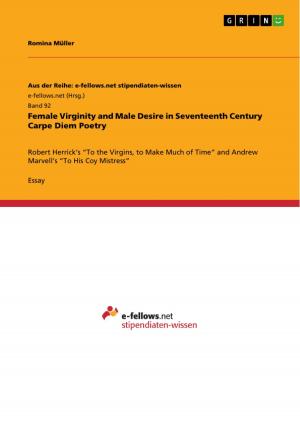The South's Failure to Adjust to Modernity
William Faulkner's 'The Sound and the Fury' and 'A Rose for Emily'
Nonfiction, Entertainment, Drama, Anthologies| Author: | Margarete Schattschneider | ISBN: | 9783640986552 |
| Publisher: | GRIN Publishing | Publication: | August 18, 2011 |
| Imprint: | GRIN Publishing | Language: | English |
| Author: | Margarete Schattschneider |
| ISBN: | 9783640986552 |
| Publisher: | GRIN Publishing |
| Publication: | August 18, 2011 |
| Imprint: | GRIN Publishing |
| Language: | English |
Seminar paper from the year 2011 in the subject American Studies - Literature, grade: 2,0, Martin Luther University, language: English, abstract: Introduction: The South, particularly the rural South, was a central aspect in Faulkner's writings, for he belonged to the South himself. He even constructed a fictitious country, commonly known as Yoknapatawpha, which provides the setting of numerous of his stories. It served as a lens through which he could examine the traditions, practices and attitudes that had divided and united the people of the South. Faulkner was mostly interested in exploring the moral allusions of history. As the South emerged from the Civil War and Reconstruction period, the people were often torn between a new and an older, more established world order. Most of the time, the culture of the South was 'inward-turning', 'backward-looking' and 'frozen in its virtues' (Warren 244). This offered an image of massive immobility, while people were fixed on moral values and gentility at the same time. Faulkner wrote about this unchangeableness and ideas of Southern gentility, in a sometimes sarcastic way. He literally attacked the way of thinking by introducing a modern writing style, which included complex and heavily loaded sentences, as well as the 'stream-of-consciousness' technique that disregards chronology of events. Thus, why did the South fail to adjust to modernity? The Sound and the Fury is considered to be an absolute classic of modernity. In this paper, Faulkner's novel The Sound and the Fury and the short story 'A Rose for Emily' will be analysed, searching for reasons to the problem of adjusting to modernity. Therefore, I will look at the depiction of the main characters and indications of role reversal with regard to the ideal Southern family. Furthermore, Quentin's fixation on the past, as well as Caddy's and Miss Quentin's rebellion against the present will be examined. Finally, a closer look at the main characters' experiences of loss in The Sound and the Fury will take place. The novel, in its struggle with modernity is similar to the short story 'A Rose for Emily' and will be set in contrast to it. Apart from the depiction of the main characters, the theme of tradition versus change as an allegory of the South plays an important role. This study, however, is only a small glimpse into a very wide subject, which could be investigated so much longer.
Seminar paper from the year 2011 in the subject American Studies - Literature, grade: 2,0, Martin Luther University, language: English, abstract: Introduction: The South, particularly the rural South, was a central aspect in Faulkner's writings, for he belonged to the South himself. He even constructed a fictitious country, commonly known as Yoknapatawpha, which provides the setting of numerous of his stories. It served as a lens through which he could examine the traditions, practices and attitudes that had divided and united the people of the South. Faulkner was mostly interested in exploring the moral allusions of history. As the South emerged from the Civil War and Reconstruction period, the people were often torn between a new and an older, more established world order. Most of the time, the culture of the South was 'inward-turning', 'backward-looking' and 'frozen in its virtues' (Warren 244). This offered an image of massive immobility, while people were fixed on moral values and gentility at the same time. Faulkner wrote about this unchangeableness and ideas of Southern gentility, in a sometimes sarcastic way. He literally attacked the way of thinking by introducing a modern writing style, which included complex and heavily loaded sentences, as well as the 'stream-of-consciousness' technique that disregards chronology of events. Thus, why did the South fail to adjust to modernity? The Sound and the Fury is considered to be an absolute classic of modernity. In this paper, Faulkner's novel The Sound and the Fury and the short story 'A Rose for Emily' will be analysed, searching for reasons to the problem of adjusting to modernity. Therefore, I will look at the depiction of the main characters and indications of role reversal with regard to the ideal Southern family. Furthermore, Quentin's fixation on the past, as well as Caddy's and Miss Quentin's rebellion against the present will be examined. Finally, a closer look at the main characters' experiences of loss in The Sound and the Fury will take place. The novel, in its struggle with modernity is similar to the short story 'A Rose for Emily' and will be set in contrast to it. Apart from the depiction of the main characters, the theme of tradition versus change as an allegory of the South plays an important role. This study, however, is only a small glimpse into a very wide subject, which could be investigated so much longer.















